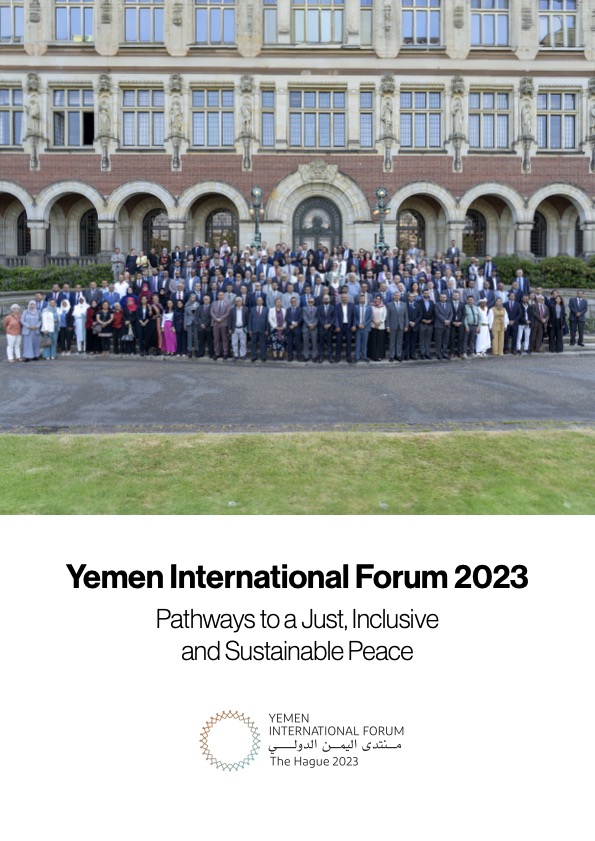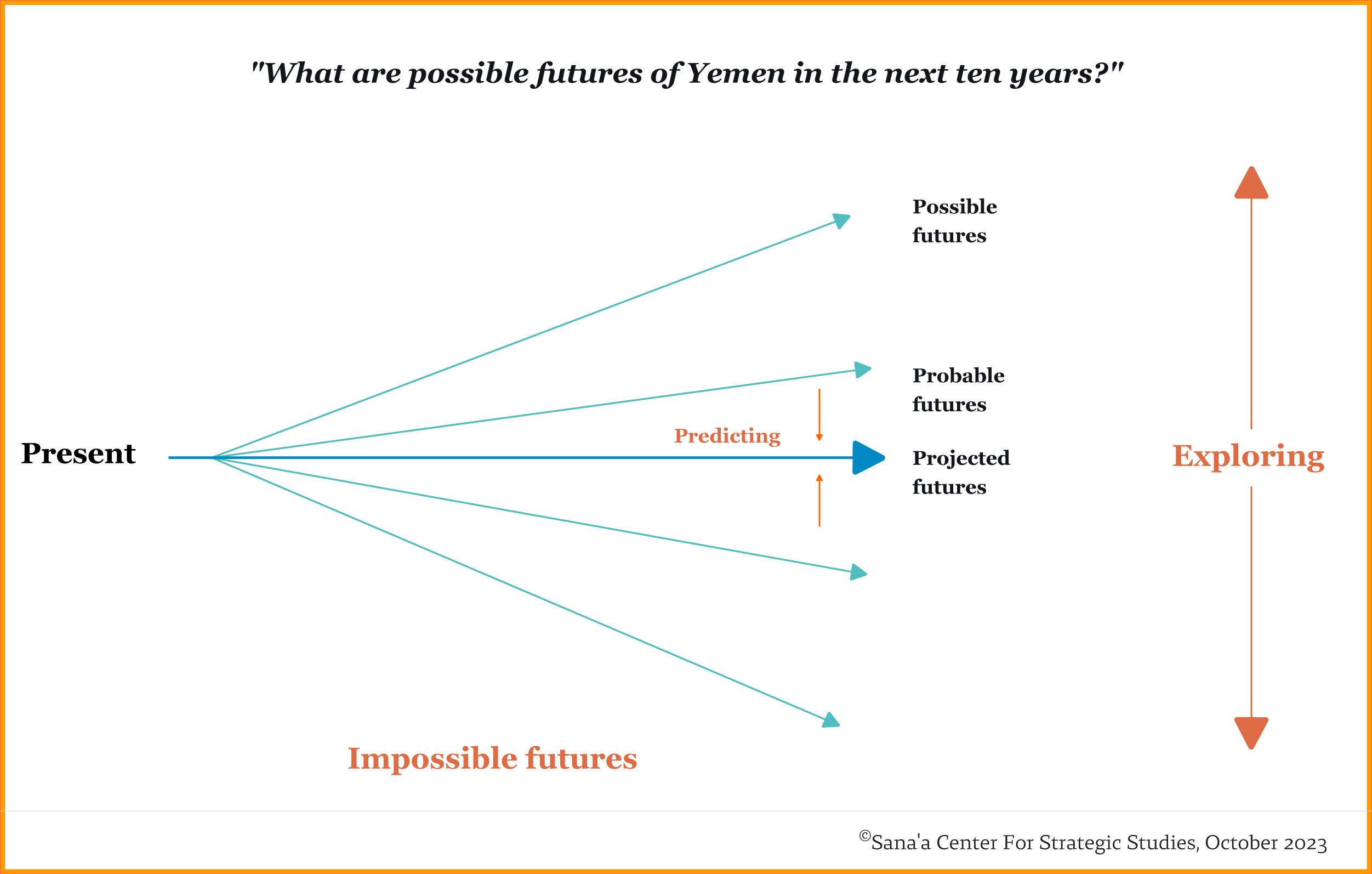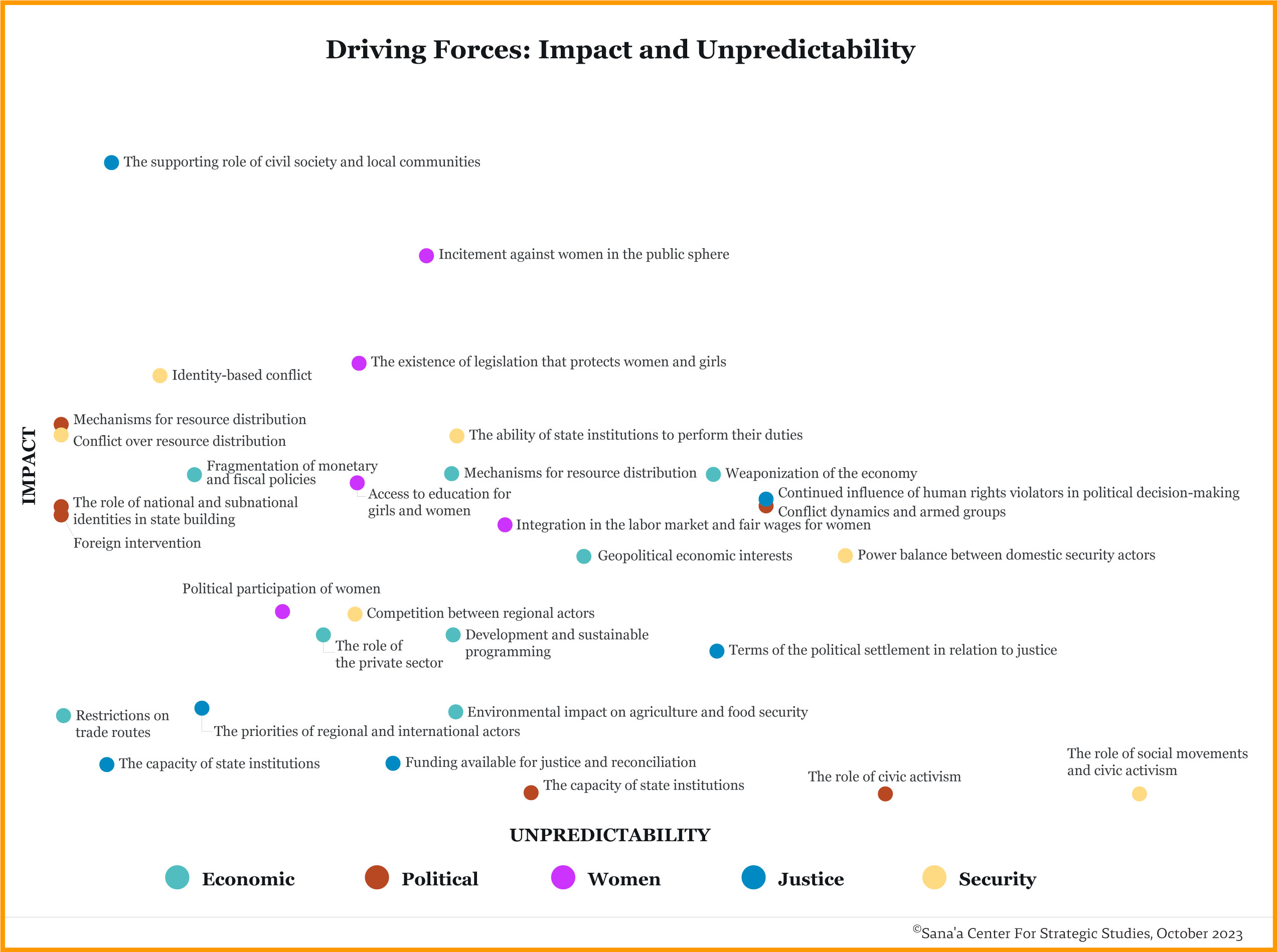Message from the YIF Director
The Yemen International Forum (YIF) began life as an ambitious if improbable idea. The aim was to have a forum conceived and implemented by Yemenis that would provide a powerful platform for bringing together as many elements of Yemeni society as possible, along with international actors, to discuss the country’s manifold problems. By attempting to build a common vision among the diverse parties beyond the formal peace process, progress might be made, even in small ways. Having a local organization lead an initiative on peace and dialogue at this scale would also empower Yemenis, ensuring solutions brought to the table are locally conceived and led.
Two years later, this homegrown approach to peacebuilding is bearing fruit. The YIF provides a neutral space for frank and open discussions, ensuring that emerging solutions and opportunities put forward by a broad base of Yemenis are amplified to inform peace-making efforts. In its design, the YIF emphasizes local ownership and local priorities by fostering collaboration and a sense of common ownership. The YIF encourages participants to think about a collective future, in which Yemenis from all walks of life can get along. This year we made some important breakthroughs, with wider engagement from the various political parties, a larger platform for minorities and victims to express themselves, bolder moves to address transitional justice, and constructive dialogue on how to de-escalate economic warfare.
Moving forward, and with the support of our dedicated team and committed partners, we will continue to strive to widen the peace process, expand participation to represent as many socio-political groups as possible, and provide Yemenis with the opportunity to convene and take the lead in planning our country’s future. The time has come to shape contemporary events rather than simply analyze why they have happened, or what got us to this point. We must take what we have learned and act, so that we might create a better country for our children and grandchildren.
Until the next Forum,
Waleed Alhariri
Director of the Yemen International Forum
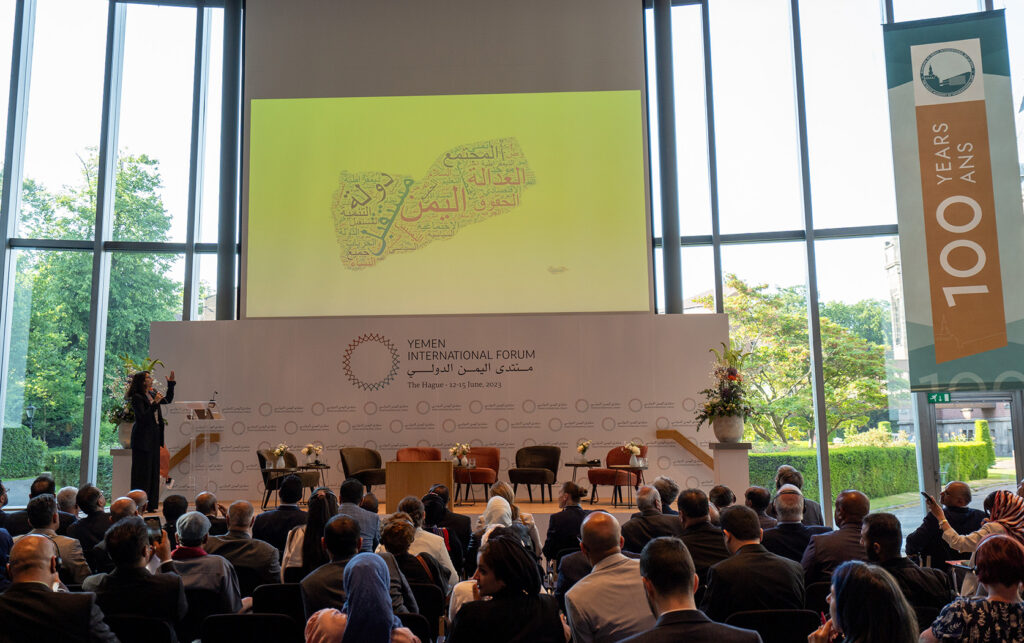
About the Yemen International Forum
The YIF is the largest international annual conference bringing together Yemeni civil and political actors to engage in constructive dialogue on Yemen’s future. The conference offers a neutral space for Yemeni actors of all stripes to come together and collectively craft solutions for sustainable peace. The YIF conference is part of a larger initiative that includes consultations with Yemeni stakeholders and experts, the production of research based on the conference outcomes, and extensive regional and international shuttle diplomacy that takes place throughout the year. These Yemeni-Yemeni dialogues are intended to complement the formal UN-led peace process, ensuring the creation and maintenance of an inclusive multi-stakeholder platform to engage in envisioning and building a post-war Yemen.
A Platform for the Aspirations of Yemenis
Yemen’s peace negotiations have been largely confined to the warring parties, sidelining many national stakeholders, who have increasingly found themselves on the margins. The future of Yemen, however, rests on how well these different segments of society engage in the peace process, and how involved they are in shaping the country’s future. This is the premise of the YIF, which seeks to represent the multiple voices of Yemenis, including those dispossessed by the war. Designed to bring together women and men from a wide range of backgrounds, the YIF gathers members of different Yemeni political parties, along with youth, civil society organizations, trade unions, tribes, the private sector, experts, journalists, artists, activists, academics, and other vital stakeholders.
To provide a safe environment for dialogue to take place, the YIF utilizes a mixture of open plenaries and discussions held under the Chatham House Rule, as well as ad hoc side meetings in which participants are encouraged to engage in frank and constructive dialogue on the future of Yemen, while offering the space for participants to navigate their differences. As a multi-stakeholder forum, and to ensure that the world’s eyes on Yemen remain open, the YIF also engages key regional and international actors, including the United Nations, the diplomatic community, and diverse experts and human rights organizations working on mediation support and conflict resolution.
Pathways to a Just, Inclusive, and Sustainable Peace
The second Yemen International Forum was convened in the Hague, Netherlands, from June 12-15, 2023. More than 200 participants attended, traveling from Yemen and other parts of the world to collectively work toward more just, inclusive, and sustainable visions for peace.[1]
Since the first Yemen International Forum was held in Stockholm, Sweden, in June 2022, important shifts have taken place on the ground. A UN-brokered truce, struck in April 2022, expired without further agreement between the conflicting parties. Despite its collapse, Yemen has witnessed a period of relative de-escalation, accompanied by significant diplomatic efforts to resurrect the truce and jumpstart peace negotiations. Peace, however, remains distant. Yemenis continue to struggle with a lack of basic services, salaries that have not been paid in years, an economy that is on the verge of collapse, healthcare systems that are overwhelmed, a fractured education system, and the radicalization of Yemen’s youth. Yemenis also continue to face severe violations and infringements of their rights, including gender-based violence, killings, arrests, the forced disappearance of activists and members of civil society, attacks against minorities, restricted freedom of movement for civilians, a stifling of the civic sphere and an alarming rollback on women’s rights aimed at limiting their participation in public life.
Against this backdrop, and building on the work of the first YIF, the 2023 Forum focused on a just, inclusive, and sustainable peace, which served as the three guiding principles that informed the different sessions and plenaries that took place over the four-day event. YIF 2023 focused on three main thematic files:
- Political Pathways to Peace: Building an inclusive peace through a Yemeni-Yemeni dialogue across political divides while guaranteeing the meaningful participation of women, youth, minorities, and civil society actors.
- Economic Recovery: Enhancing resilience and early recovery, focusing on the banking sector and pathways to revitalizing key economic sectors.
- Justice and Reconciliation: Building a just peace, with redress for victims and respect for human rights, allowing for the restoration of social cohesion.
Other themes – Gender equality and women’s participation, security reform, and the environment and water – were incorporated throughout the Forum’s agenda in different plenaries and side sessions.
Key Outcomes In Brief
- A Roadmap for Transitional Justice: One of the boldest messages of the YIF 2023 was asserting the need for transitional justice to prevent future cycles of violence. A declaration endorsed by more than 30 civil society leaders was presented at the YIF, intended as a prelude to a more comprehensive transitional justice roadmap being worked on by the YIF team in conjunction with other civil society organizations and the international community. The roadmap will focus on key steps, including better documentation of violations and wider conversations between stakeholders on what shape transitional justice should take.
- A Victim-Centered Approach: Victims of Yemen’s war were widely represented at YIF 2023, including victims of coalition air strikes, landmines, gender-based violence, persecution, arbitrary detention, and torture. The Forum offered a much-needed platform for their voices to be heard, but more needs to be done to strengthen victims’ associations and support victims to better organize themselves. In the short term, a mapping exercise of the various victims’ unions and associations will be conducted to identify their needs and priorities.
- Renewed Pledge to Stop the Systematic Exclusion of Women: Faced with a worrying setback in women’s rights and an increase in gender-based violence since the start of the war, the international community and the UN must do more to use their leverage to address the exclusion of women. At YIF 2023, multilateral organizations operating in Yemen were urged to comprehensively collect data on gender-based violence and take an unequivocal public stance against restrictions on women’s movement and participation in public life.
- Protection of Minorities: Marginalized minority groups are increasingly facing a precarious situation in Yemen, with the conflict exacerbating existing vulnerabilities and eroding the already limited legal rights they enjoy. Clear mechanisms need to be adopted to secure their inclusion in the peace process and protection for minority groups in a post-settlement context. To that end, continued conversations around the importance of legal reforms to protect minorities must take place in order to raise the profile of their plight, and advocate for their access to education, healthcare, and security.
- Deterring Armed Groups: As Yemen continues to witness an alarming rise in the number of armed fighters, options for security sector reform were discussed, ranging from strengthening the role of civil society and tribal leaders in local security oversight, including for localized ceasefires, to the need for a central coordination mechanism across governorates and warring parties areas of control, and exploring the possibility of a decentralized security sector where demobilization efforts are led by local authorities. A technical group composed of different national security experts was formed following the YIF to explore workable solutions to the rise of armed groups in the country.
- Integration of Local Mediators: Local mediators continue to do the bulk of peacebuilding work within their communities, often faster and more efficiently than more conventional channels that work toward diffusing conflict. The rich tradition of local mediation in Yemen must inform national mediation efforts. The international community, and the office of the UN Special Envoy in particular, would benefit from creating synergies with local mediators and establishing mechanisms for more regular communication and coordination.
- An Economic Truce: In tandem with a political settlement, Yemenis need an immediate economic truce. This should be brokered by the UN Special Envoy’s office, with key issues such as neutralizing the banking sector, and de-escalating the economic measures and countermeasures taken by the warring parties proactively addressed. A comprehensive economic matrix was developed by a group of experts, bankers, and economists attending the YIF, building on the outcomes of the YIF 2022 in Sweden. The matrix offers practical steps and actions to help navigate and address bottlenecks in the economic file, serving as an entry point to influence policy and bring different parties together to develop economic solutions.
- Engaging the Private Sector in Economic Recovery: The private sector has played a vital role in mitigating the effects of the ongoing conflict and in filling gaps left by the collapse of the country’s public institutions. In the transition from humanitarian relief to economic recovery, coordination with the private sector will prove key. Strengthened collaboration between international actors, the government, and private sector organizations can better drive the rebuilding of infrastructure, the provision of public services, and the revitalization of strategic economic sectors such as fisheries and agriculture.
- Addressing Yemen’s Water Crisis and Vulnerability to Climate Change: As the conflict has taken center stage, the country’s vulnerability to climate change has taken a backseat, as has its pre-existing water crisis. Yemen’s precarious environmental situation presents an existential risk to its future, and water scarcity is one of the primary drivers of conflict. Investment in early warning systems, reconstruction projects that take the environment into account, and access to climate financing were all priorities flagged at YIF 2023. Supporting technical solutions to reduce the agricultural sector’s water dependency was also deemed of paramount importance. To access the international support available for climate financing, recommendations were put forward to develop policy briefs on water governance, climate change adaptation, and climate finance.
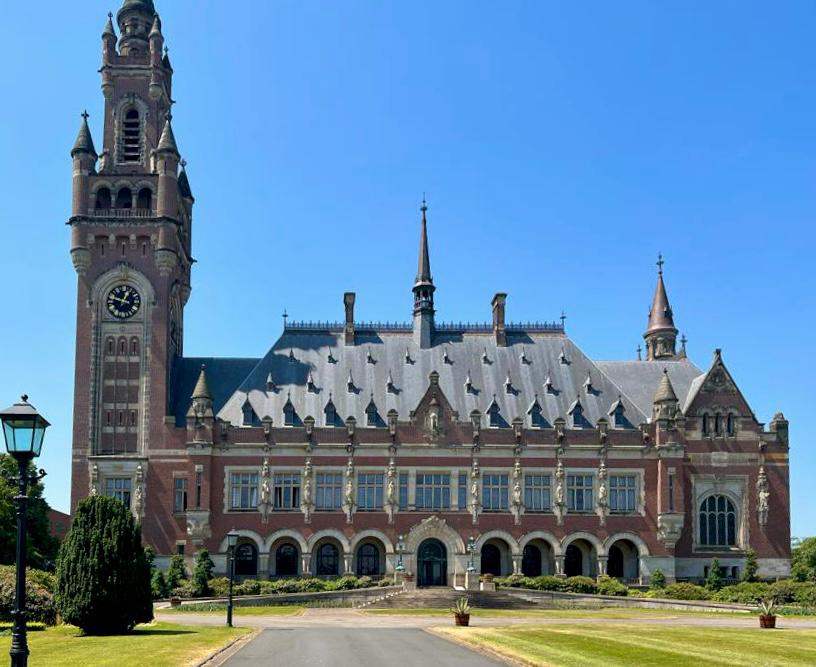
From a Place of Peace
From the heart of the Peace Palace in the Hague, Maged al-Madhaji, Chairperson and Co-founder of the Sana’a Center, told participants that the convening the Forum did not mean peace was imminent, but that the YIF serves to reflect the aspirations of Yemenis and build consensus on practical visions and ideas for the future of Yemen. “We will never tire of reviving opportunities for dialogue,” said Al-Madhaji. “No matter how futile these attempts might seem, we believe that discussion and the development of ideas are the beginning of a path toward change.”
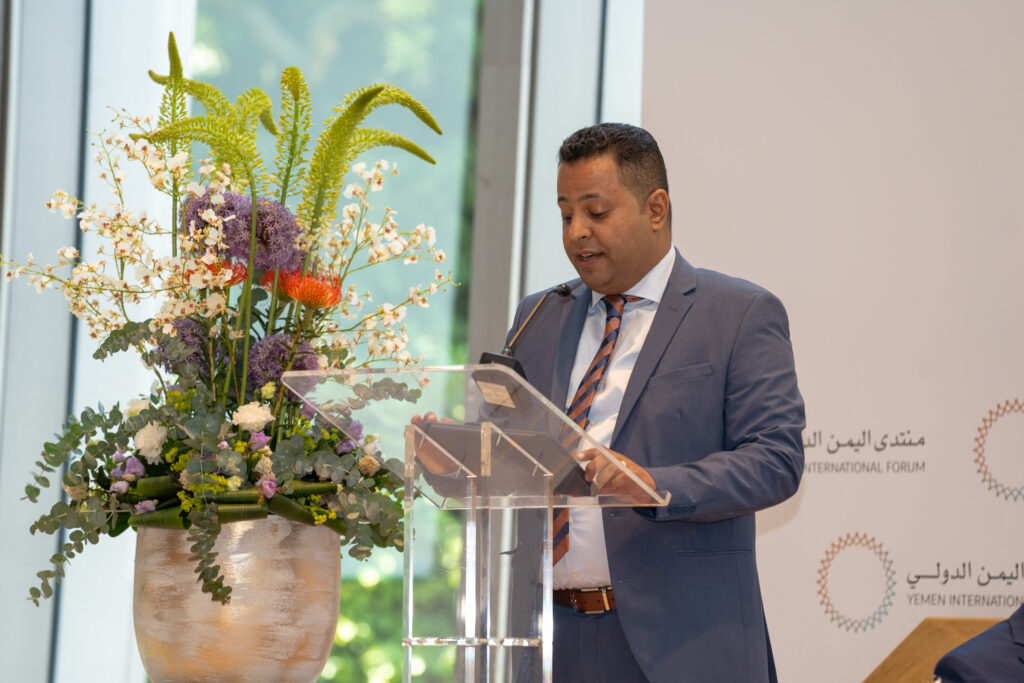
Drawing on the historical symbolism of the Peace Palace, which houses the International Court of Justice, H.E. Paul Huijts, Secretary-General of the Dutch Ministry of Foreign Affairs, reminded the audience how Europe learned the hard way that unresolved grievances can become a breeding ground for future conflict, noting that there can be no lasting peace that is not inclusive, nor can there be peace without addressing justice and accountability. Setting the tone for collective discussions among the different stakeholders, he spoke about the importance of shifting focus, and rising above habitual narratives to envision how a peaceful society can emerge in Yemen. “You cannot build a better future if you don’t have a vision of what that future should look like,” he said, “and how it will differ from the past.”
Southern Solidarity and Dialogue
Unreconciled grievances were a dominant theme among YIF participants, notably among those attending sessions that brought different parties representing southern Yemen to the table. This year saw rich engagement and a wider participation from southern parties, including a high-level official delegation from the Southern Transitional Council (STC), Al-Mahra’s Sit-in Committee, the Hadramawt Inclusive Conference, the Southern Revolutionary Movement, Southern Hirak, as well as independent southern activists and prominent political figures. The discussions came against the backdrop of a trying year for the Presidential Leadership Council (PLC), which continues to suffer from discord and division among its members since its formation in April 2022. The YIF took place just weeks after the Southern Consultative Meeting was launched by the STC on May 4, 2023, bringing together a range of southern actors and leading to the announcement of the STC-led Southern National Charter.
Some YIF participants underscored the need for STC-led consultations to be more inclusive of the various southern parties, and in response, the STC noted that the Southern National Charter was a living document subject to revision. In its first opportunity to engage with a diverse variety of national stakeholders and diplomats present at the Forum, STC members reiterated the group’s commitment to unity among southern stakeholders and its support for the PLC, a statement welcomed by international diplomats present in the Forum who emphasized that the PLC is the only recognized governing body in Yemen. Despite divergent perspectives on the STC’s efforts to bring together different southern factions, and the contentious debate of secession versus unity, attendees agreed on the urgent need for a united southern front, and failing that, face up to the ramifications of further militarization of the south.
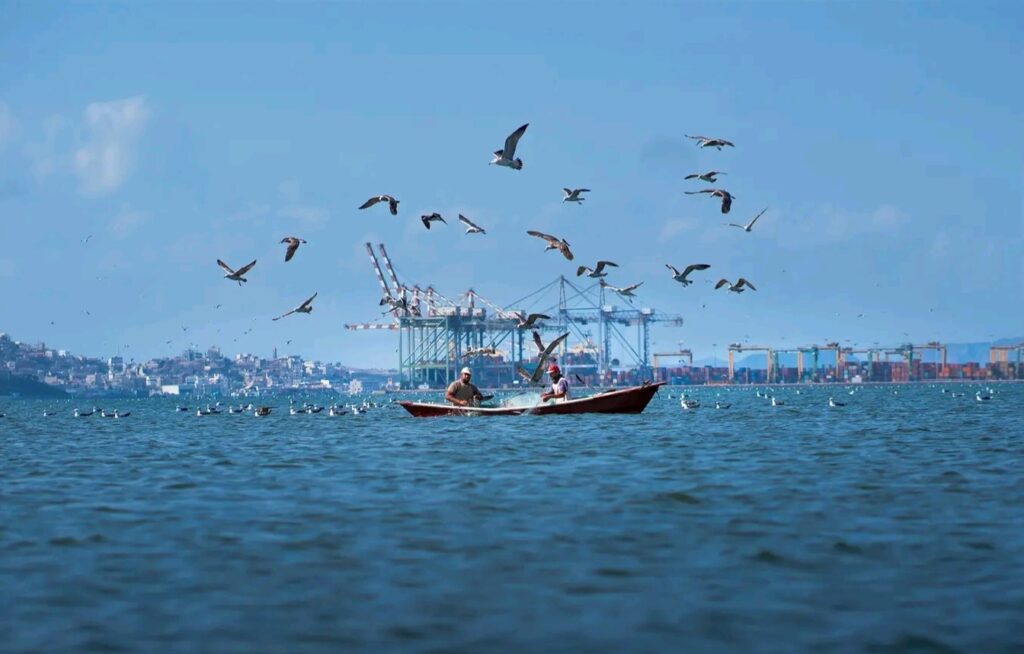
The Urgent Need for an Economic Truce
Yemenis cannot afford to wait for a peace agreement to address the failing economy. This was the overall message delivered by YIF participants attending various sessions on economic recovery, which featured as one of the three core YIF thematic issues. “The suffering caused by the failing economy is more painful than that of any military or political issues,” said Ali al-Hebshi, a prominent businessperson who was part of a panel on shaping the future of Yemen, noting that alongside political de-escalation, Yemen was in urgent need of an economic truce. “Economic challenges have impacted every single household in our country,” he added, citing the loss of jobs, the split monetary system, unpaid salaries, skyrocketing prices, stunted economic growth, and a banking sector on the verge of collapse. To mitigate the fallout from the war, participants urged the brokering of an economic truce to contain the warring parties’ ongoing escalation over the banking sector. Such mediation, brokered by the UN Special Envoy’s office, should first focus on technical aspects in which parties to the conflict have joint interests and could implement separately, such as regulating money exchangers and supporting digital financial services.
Addressing growing appeals by Yemeni participants for donors and the international community to support more long-term programming and transition from humanitarian relief to economic recovery, David Gressly, the United Nations Resident Coordinator and Humanitarian Coordinator for Yemen, said such a shift comes with risk. “We need to resist the impulse, that if peace is on the horizon, of moving immediately to development and drop humanitarian assistance,” Gressly said in the opening remarks of the YIF conference. “This is not a relay race. This is a transition that will take time, and humanitarian assistance will be required for a number of years going forward until we can find an economy that’s truly recovered.”
Yemeni experts, however, reiterated calls for a shift from humanitarian aid to development and for more focus on state-building. “What Yemen needs is to transition from the relief phase to the development phase by relying on a three-pillar approach that consists of the private sector, local authorities, and civil society in all its components, including unions and political parties,” said Rafat al-Akhali, Fellow of Practice at the Blavatnik School of Government, Oxford University. In a plenary on shared economic visions for early recovery, Tania Meyer, the World Bank Country Manager for Yemen, said that “it does not have to be either humanitarian or development,” adding that embracing such a binary framework would do Yemen a disservice. Underscoring that recovery and reconstruction will ultimately need to be driven and led by Yemenis, she said the role of the international community is to “support, support, support,” with a particular focus on locally driven interventions, investing in Yemen’s youth, and supporting the private sector, whose entrepreneurial spirit has helped fill the absence of a functioning state.
In a session on the role of the private sector in economic recovery and reconstruction economists and business leaders urged the government to coordinate with the private sector, noting the vital humanitarian role it has been playing to mitigate the effects of the collapse of public institutions. Participants stressed the importance of building partnerships and supporting strategic collaboration between the public and private sectors, particularly in infrastructure and in the provision of public services, while working to keep the private sector neutral and separate from the conflict. In a session on revitalizing strategic and economic sectors, experts from diverse backgrounds held detailed conversations about how to revitalize two important economic sectors: agriculture and fisheries. Discussions were held on the importance of water harvesting programs, knowledge transfer, and the adoption of modern techniques to help farmers, along with innovative mechanisms to develop Yemen’s fishing industry, and the ability of these sectors to adapt to climate change.
No Peace Without Justice, No Justice Without Accountability
As one of the three core areas highlighted this year, transitional justice was a central topic of discussion, despite the hesitancy and resistance last year from both local and international actors concerned that such a contentious issue could risk derailing the peace process. This year witnessed broader endorsement and support for the need to discuss transitional justice, based on the understanding that the pursuit of justice and redress for the countless victims of Yemen’s war is a fundamental principle underpinning peace. But what does transitional justice mean to Yemenis? Does it start now or after a peace settlement? Will it entail redress and reparations for victims of Yemen’s war, and in what form? Will it be punitive or conciliatory? Will it tackle criminal accountability? These were just some of the delicate issues addressed during sessions that brought together victims and survivors to share their stories and exchange ideas on what justice could look like.
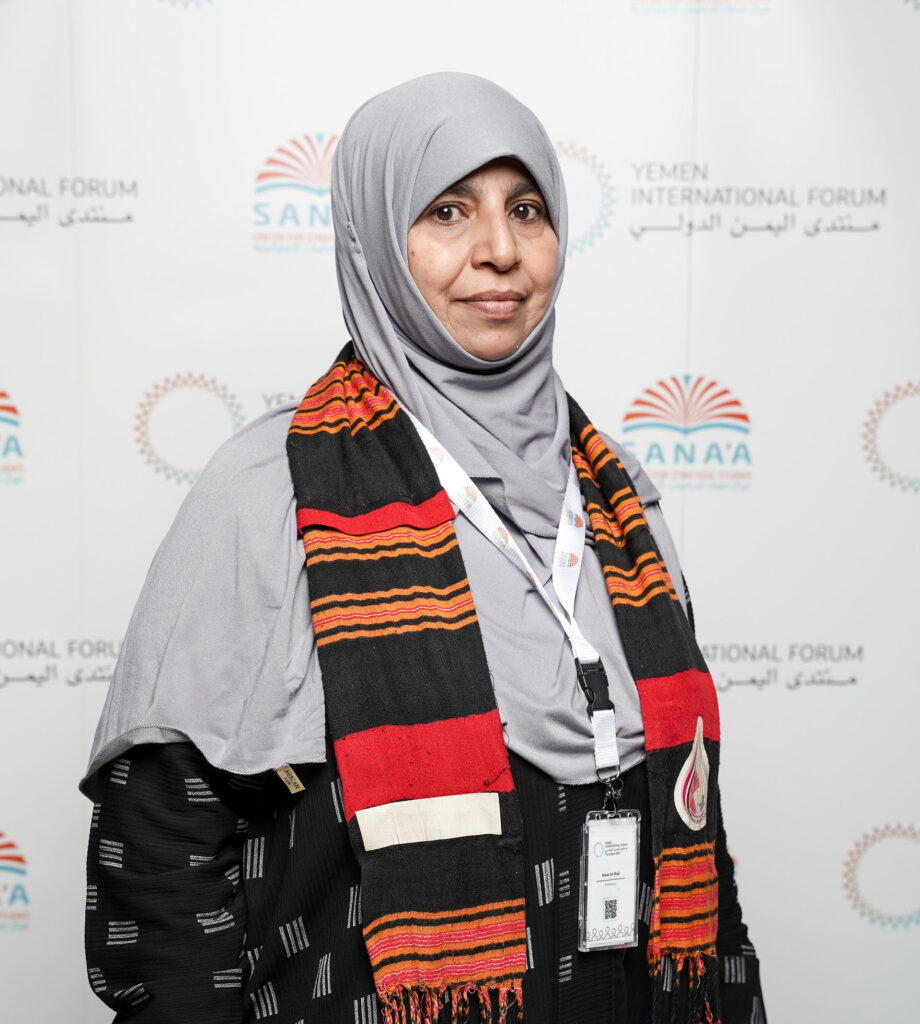
“From this symbolic place, a place for peace, we demand that there is a comprehensive peace. There cannot be peace without justice. And there cannot be justice without accountability,” said Amat al-Salam al-Hajj, in one of the opening plenaries on the first day of the conference. The founder of the Abductees’ Mothers Association, an organization formed at the gates of a prison in 2015, she warned the audience that cycles of violence and revenge will continue if accountability and reconciliation are not addressed, adding: “These victims are a ticking time-bomb.” Echoing Al-Hajj’s cautionary tone, a high-ranking representative from the international community said in a side session, “what we should never do is accept a peace process with an amnesty.” The fear of civil war and deterioration, which has driven Yemenis to accept flawed peace agreements in the past, has come back to haunt them, he said. Narrating his own experience in witnessing the Yemeni peace negotiations in 1994, along with failed efforts to address reconciliation or transitional justice, he pointed to the current situation as the price paid for failing to address difficult issues in the past. “The failure of the UN in 1994 is one of the factors why we are here now. The failure of the National Dialogue Conference is also the cause of what we see now,” he said, referring to what he called the “disastrous choice” of granting former president Ali Abdullah Saleh immunity from prosecution, and maintaining the power of the old elite more broadly, under the Gulf Cooperation Council (GCC) initiative in 2012.
Despite a clear demand for justice, how this would take shape in the Yemeni context needs further consensus, agreed participants. However, the importance of strengthening victims’ unions, coordination amongst NGOs, and documentation efforts were seen as foundational steps in the path towards transitional justice. Documentation, not just as an investigative mechanism for criminal accountability, but also for the purposes of history and memorialization, was discussed passionately by attendees, with debates on whether formalizing its process and working towards a centralized database for human rights violations could potentially do more harm than good given the sensitivity of the material. One former detainee and victim of torture said that regardless of whether criminal accountability is sought, restoring the dignity of victims is paramount. Describing his own experience of being released from prison, and the inhumane way he was approached to give testimony of his detention, he estimated that half of such cases are poorly documented because many, like him, refuse to give evidence due to the inexperience of those in charge of documentation. He urged the CSOs and members of the international community present at the session to consider how to provide better guidance and support on documenting human rights violations in order to preserve and restore the dignity of victims.
Members of the international community were urged to create more fertile ground for transitional justice. Noting that language advocating for transitional justice is often absent from Security Council and other UN resolutions, an expert on transitional justice urged the international representatives present to take action. “You need to mention this [transitional justice] in your briefings. If you’re not putting it out there, you are making it difficult for progress,” she said, urging them to be bold and press on even if the appetite for it is not present internationally. Discussions on a transitional justice roadmap for the pursuit of Yemen culminated on the last day of the conference, where a draft joint declaration to advance justice and reconciliation in Yemen, developed collaboratively by more than 30 Yemeni CSOs and local and international experts, was announced at the concluding session and distributed to participants.
“We reject any political process that ignores our call for justice, or that seeks to compromise our demands in exchange for so-called political stability. Sustainable and lasting peace can only be achieved by welcoming reconciliation through justice.”
The Yemen Declaration for Justice and Reconciliation
The pursuit of justice is not an endeavor fueled by unrealistic hopes, but a fundamental principle that underpins stability and peace. This is the premise of the justice declaration draft presented at YIF 2023, collaboratively developed with input from over 30 Yemeni civil society organizations (CSOs). CSOs have emerged as crucial actors in the chaotic landscape of Yemen’s ongoing war, providing vital services, shedding light on human rights abuses, advocating for local causes, and holding officials accountable. Those pursuing activities beyond the humanitarian scope, such as organizing victims’ groups, documenting violations, and advocating for abductees, operate in a volatile and perilous environment, with little support from the outside and limited coordination with their peers. Coordinated efforts can facilitate the growth of local organizations and increase their impact on transitional justice initiatives.
The declaration aims to serve as a catalyst, harmonizing efforts and fostering collaboration to pave the way for transitional justice. It will provide a shared platform for articulating principles and demands across civil society, uniting Yemeni CSOs around a collective vision, while building momentum towards achieving transitional justice and establishing an ecosystem of cooperation and coordination that empowers CSOs to actively participate in peace talks. Following the YIF, the declaration was refined and launched on July 26, 2023, and subsequently endorsed by many Yemeni CSOs.
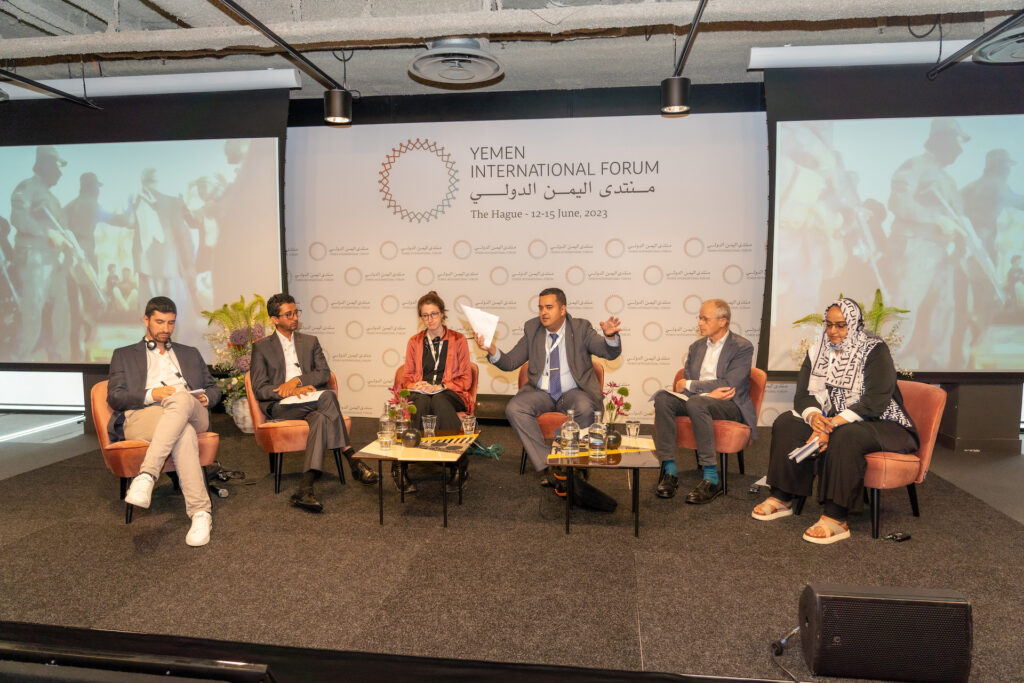
Security Sector Reform and Mediation
Building on extensive discussions on the process of disarmament, demobilization, and reintegration (DDR) of fighters that took place at last year’s Forum, YIF 2023 sessions revisited the viability of disarming a population that is heavily armed and has a deep local tradition of bearing weapons. “We had a quasi-organized army and now we have armed groups that are not organized and not under anyone’s control,” said one expert attending the session on stabilization and security sector reforms, estimating the current number of fighters in Yemen at roughly 2 million, many of whom have resorted to joining armed groups to earn an income in light of Yemen’s dire economic situation. Traditional DDR processes, he added, are unfeasible in the Yemeni context, and will create a financial burden that will frustrate economic development, given that some regions in Yemen traditionally rely on security sector jobs.
The idea to decentralize the security sector to the governorate level, proposed during YIF I, was further discussed in an attempt to find “out-of-the-box” solutions to this dilemma. To deal with the huge numbers of fighters, at the least possible cost and in the least disruptive manner, experts discussed the possibility of establishing a civil defense reserve force in each governorate, with some participants expressing backing for the proposal and others viewing it as unfeasible and risky.
Top-down security sector reform, however, will not happen any time soon. In the absence of the state, civil society and communities in Yemen have stepped in to fill gaps in the oversight of the security forces, promoting the rule of law, limiting violations, and mediating conflicts. Countless examples of civil action by tribes and civil society were brought up by local mediators gathered at the YIF, ranging from initiatives that helped open blocked roads, reopen closed airports, mediate prisoner exchanges, sensitize the police force to human rights, release detainees, close down secret prisons, and establish codes of conduct for security forces in Taiz and Aden. Many of these initiatives were led by Yemeni women. “Yemenis, by nature, tend to be mediators,” said one participant in a session on scaling up local mediation practices, noting how traditions of mediation have played a key role in maintaining social cohesion and protecting civilians from the effects of war. Mediation, argued civil society actors, can be more effective, flexible, and adaptable than formal negotiation processes, since it does not require lengthy protocols and relies on traditional customs and norms. Ensuring a more direct line of coordination between mediators and the formal peace process led by the UN could help shift the focus toward building upon local models of resolving conflict. The Office of the UN Special Envoy of the Secretary-General for Yemen (OSESGY) in particular could play a positive role by building on the work and feedback of local mediators.
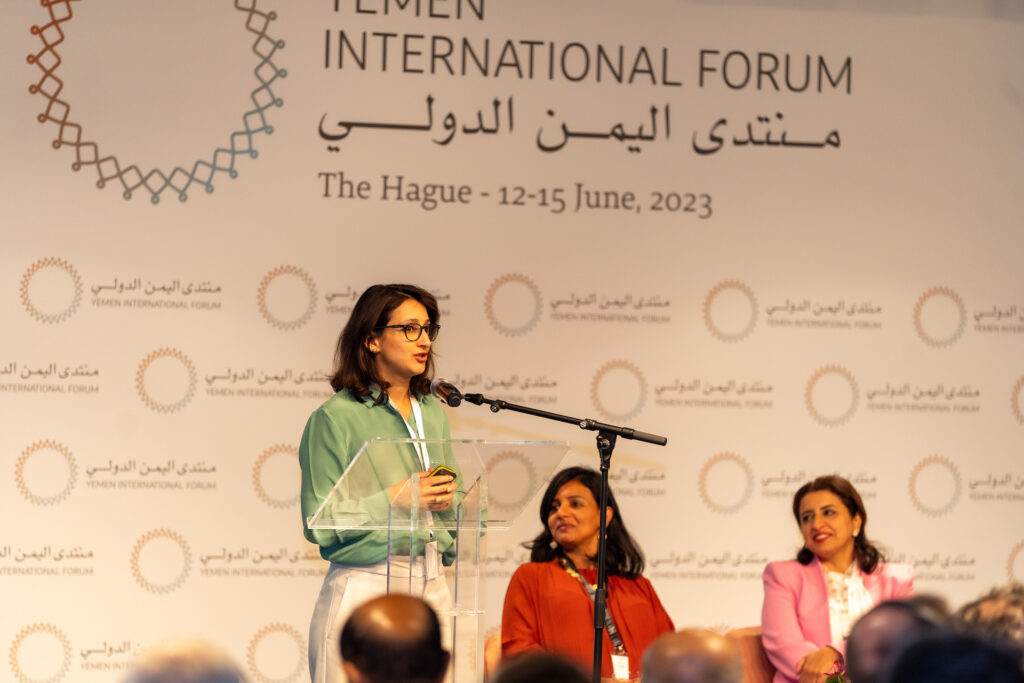
Gender-Based Violence and the Marginalization of Women
The marginalization of Yemeni women took center stage at this year’s YIF, in response to the worrying increase in violations of women’s rights since the war began. “The dignity of Yemeni women has been directly attacked,” said Wedad al-Badawi, a Yemeni TV presenter and a well-known media personality who spoke as part of a panel on missed opportunities to tackle women’s exclusion and multifaceted forms of gender-based violence.
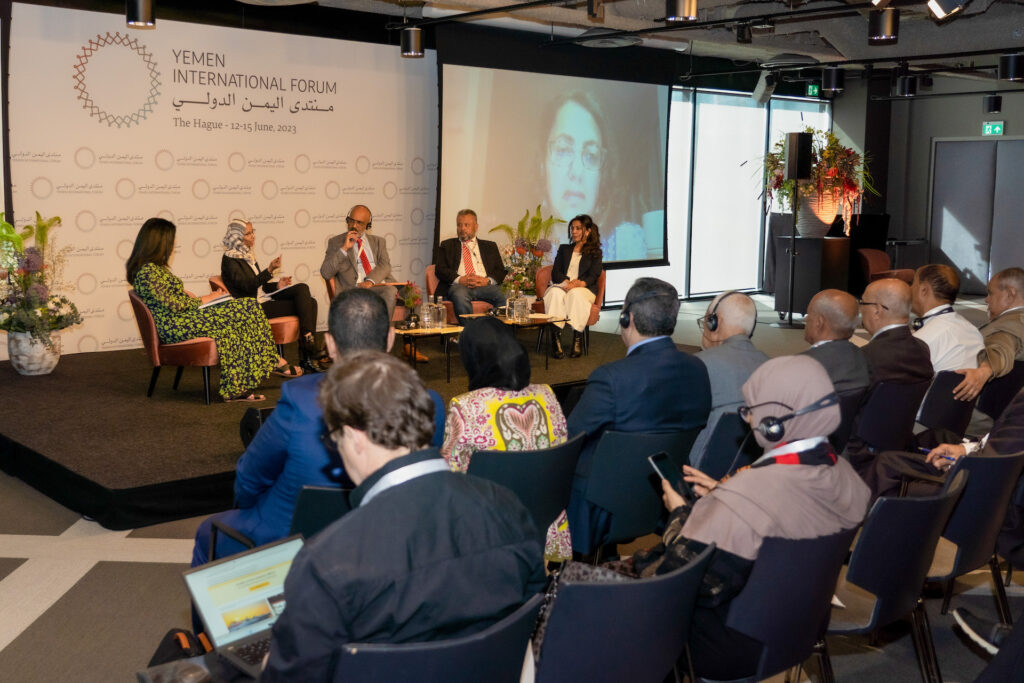
She recounted her own challenges traveling to the conference from Sana’a, where the Houthi authorities now require a mahram (male guardian) for women to travel in territories under their control. Al-Badawi said she felt let down by the international community and appealed for support lest women’s silence be understood as complacency. “We have to appeal to them because the political parties don’t listen to us. But the reality is that they listen to the international community,” she said. Addressing disturbing trends such as the increase in gender-based violence (GBV) in Yemen public policy expert Sawsan al-Refai urged those present in the audience to ensure GBV is being adequately reported on and its prevention prioritized. Failing to do this, she added, will mean that “this issue is being erased from the collective memory of the international community.” Echoing Al-Refai and other panelists, Sherine El Traboulsi-McCarthy, Director of the National Center for Research in the UK, said, “We need a much more authentic understanding of the priorities and authenticity of the failures,” noting that despite clear shortcomings in the international community’s approach to aid in Yemen, there has been little change, with international programs maintaining “a very naive, linear approach,” lacking nuance and shorn of context, with an over-emphasis on capacity building.
In side sessions, the legacy of southern women and the feminist experience prior to unification was said to have been demeaned by southern political parties, which have few women among their ranks, mostly relegated to special desks for “women’s affairs.” “We are not living our best days,” said a human rights lawyer and southern activist, who accused political parties of “forgetting the history of southern women.” In another session on local mediation, one female community leader asked, “Who is starting the fire, and who is extinguishing it?”, noting that women have stood at the epicenter of social cohesion initiatives in their communities.
Climate Change and Building Resilience
In a session on water governance reform as a precursor to tackling the water crisis, various experts and representatives discussed Yemen’s severe water crisis and explored technical coordination in the sector. “If nothing is done to address the water crisis in Yemen, all other issues spoken about during the Forum are completely irrelevant,” said one international expert, noting that renewable water availability per capita in Yemen was 74 cubic meters per annum, which is “off the scale” in terms of scarcity. “Sixty years ago residents of Sana’a were drinking from surface water,” said an environmental expert on Yemen. “Now a well needs to be dug to a depth of 800-1000 meters to get water,” they added, referring to the overuse of deep-well irrigation in Yemen, which is decreasing the availability of water for poorer communities.
Agricultural experts said that much of the water used in agriculture, which accounts for 80 to 90 percent of total consumption, is wasted due to inefficient irrigation practices. The solution, argued one expert, would require a change in strategy in agricultural development and irrigation, a switch to rain-fed agriculture and improved rain-harvesting methods. Another participant stressed the need for new technologies and reliable studies that take into account the different irrigation methods suitable for the different regional crops. One participant noted that more studies are needed to understand the extent of groundwater depletion due to solar-powered pumps of various aquifers. Participants stressed that tackling the water crisis would require strengthening existing institutions and better coordination between the Ministry of Agriculture and the Ministry of Water and Environment, as Yemen’s National Water Strategy has been defunct since the start of the conflict.
Yemen is ranked 22nd in a list of the countries most vulnerable to climate change, and is the 14th least ready to adapt, said Jeehan Abdul Ghaffar, an independent development expert and advisor to the World Bank Group, speaking as part of a panel on climate change and its impact on livelihoods and economic recovery. Climate change is estimated to account for more than 10 percent of the population displacement that has taken place in Yemen since the conflict began. An increase in temperature, flash floods, tropical cyclones, desertification, and prolonged droughts are just some of the extreme weather events increasingly taking place in Yemen, said Anwar Noman, a representative from the Climate Change Unit at the Ministry of Water and Environment.
The conflict in Yemen, argued the panelists, is diverting resources away from the adaptation and mitigation efforts needed to confront the effects of climate change. These include the need for early warning systems, nationwide advocacy campaigns, rain-fed agriculture, and reducing deforestation, among other initiatives. The reconstruction of Yemen must entail building back better and greener, said Leoni Nimmo, Research Associate at the Conflict and Environment Observatory, adding that reconstruction funds need to have long-term environmental stability in mind. The relevant Yemeni institutions on the ground, however, are finding it difficult to access crucial global climate investment funds, which tend to be risk-averse and not easily accessible to conflict-affected states. The shift to humanitarian relief following the crisis, which has drastically reduced donor funds to climate change programs, also poses a challenge. “From 2010-2017,” said Noman, “Yemen got less than $2 per capita per year for climate adaptation measures.” Noting how countries in the region such as Morocco and Egypt have been more successful in accessing global climate funds, panelists stressed the need for Yemen to draw lessons from the experiences of other developing countries in the throes of climate change. To secure more financing, more data needs to come from inside Yemen, urged Nimmo.
Scenario Building to Help See Beyond the Current Deadlock
This year, the YIF incorporated elements of an internationally validated, innovative methodology known as the transformative scenario process (TSP).[2] TSP is gaining traction as a way of engaging with complexity and uncertainty, and involves diverse stakeholders engaging in dialogue about the future.[3] Participants are invited to hold back the impulse to advocate for a desired future, and instead explore how the future might unfold.
During the YIF, a series of workshops introduced TSP as an approach that can help diverse stakeholders plan for the future despite the uncertain and volatile context in Yemen. TSP can help lower the barrier for people with diverse and sometimes conflicting perspectives to engage with one another, and forces the immediate focus away from the conflict and shorter-term considerations to longer-term trends and the broader context. It can help broaden the conversation to include people whose voices are often not heard in more traditional dialogue formats, and encourages participants to set aside wishful thinking, engage the imagination to explore new ways forward, and build trust.
Five scenario building sessions, involving over 100 participants, were conducted on the following themes: The Role of Women in Public Life; Stabilization and Security Structures; Justice and Reconciliation; The Political System and Civic Life; and The Economy. Central to each workshop was the discussion of various “driving forces”[4] that are likely to shape how each one of the five themes will unfold over time. YIF participants engaged in two exercises: an individual assessment of the relative impact and relative unpredictability of each driving force;[5] [6] and a group discussion identifying different possible outcomes for each particular driving force, telling a small story about each of these.
The emerging pattern from the participants’ assessment of the driving forces suggests that one of the driving forces with the highest impact is the supporting role that civil society and local communities could play in justice and reconciliation. Other factors with high impact and relatively low-level of unpredictability are identity-based conflict and security conditions and incitement against women in the public sphere. Participants in multiple scenario building workshops underlined the high impact of wealth-sharing and resource distribution to resolve political, economic, and security issues, indicating that it is a cross-cutting driver. Other driving forces that were assessed by the participants as relatively unpredictable include the weaponization of the economy, the continued influence of human rights violators on political decision-making, conflict dynamics and the role of armed groups, the power balance between domestic actors, and the role of civil society in shaping the political process and the security sector. Their characterization as unpredictable indicates that these driving forces may go in unexpected directions and could be influenced, either positively or negatively.
The Way Forward: Three Messages from YIF 2023
- Peace Must Be Inclusive
YIF 2023 delivered a strong message, cautioning that no single group in Yemen can claim broad, national representation. This message is particularly poignant, given ongoing political developments in the country. Recent Houthi-Saudi negotiations represent a significant breakthrough, and an opportunity to push forward a national cease-fire, but any settlement that emerges will reflect the interests of the powerful, excluding the vast majority of Yemenis, and thereby court failure. The “big tent” approach adopted by the YIF, a methodology not unlike the National Dialogue Conference, secured broader participation and engagement of key political actors this year, encouraging trust-building between parties while providing an influential platform for marginalized actors to articulate their visions of peace. These actors include women, half of Yemen’s population, who are being sidelined and shunted into the private sphere; political parties, whose historical legitimacy can act as a bridge between various sub-groups; southern stakeholders, whose demands for self-determination will prove critical to a sustainable peace process; civil society organizations, tribes, and local mediators, who, in the absence of a functioning state, have taken charge of delivering humanitarian relief and maintaining the social cohesion of communities; minorities, who have been brutally persecuted by the warring factions; and last, but not least, youth, Yemen’s greatest asset and the generation who will ultimately become responsible for rebuilding the country.
- Peace Must Be Just
In a blow to thousands of victims, on October 8, 2021, the UN Human Rights Council rejected a resolution to renew the mandate of the Group of Eminent Experts assigned to investigate war crimes in Yemen. The YIF delivered a bold message that peace in Yemen cannot come without addressing justice and accountability, and that for the first time in the country’s history, the grievances of the countless victims of war must be addressed. “Do we want a generation that keeps repeating the same mistakes, or aim for a new way of thinking?” asked a victim attending the Forum. Without redress for victims, trust in the rule of law and governance and the relationship between the state and people in Yemen will ultimately remain broken, as proven by previous settlements in the region that bypassed accountability (such as the 1989 Taif Agreement, which helped end Lebanon’s civil war). Those present at the justice sessions agreed, however, that the road towards achieving justice won’t be easy. To start with, a common understanding of what justice means for Yemenis still needs to be reached. The intense discussions that took place at the YIF this year, however, represent an important step towards the normalization of transitional justice discourse on Yemen, and in so doing, break the deafening silence surrounding it in international forums. The importance of documenting violations, and supporting victims’ unions, were among the most important outcomes of this year’s discussions on transitional justice, which culminated with a presentation of a justice declaration eventually endorsed by more than 30 Yemeni civil society organizations, endorsing the fight to advance justice and reconciliation in Yemen. This declaration forms part of a wider roadmap for transitional justice currently being worked on by civil society organizations, with the facilitation of the YIF team.
- Peace Must Be Sustainable
Nine years of war have demonstrated that Yemenis cannot wait for a political settlement to start rebuilding their country. For durable peace to be achieved, there are fundamental priorities that must be addressed immediately. Demands for an economic truce – for warring parties to cease escalatory economic measures and countermeasures – were on every participant’s lips, and were universally supported. As the warring parties inch closer toward potential political settlements, the outstanding points of contention are predominantly economic. On the ground, as households struggle with the dire economic impact of the war, experts are becoming increasingly concerned about the sustainability of an economy built almost entirely on humanitarian aid. A group of economic experts will begin studying how to transition to economic recovery and longer-term development, ways to save the banking sector, and how to better coordinate with the private sector, as they push the OSESGY to ensure the economic situation is given the necessary attention. In parallel, the YIF highlighted how the impact of climate change is part and parcel of economic sustainability, underlining the importance of designing a recovery process from an environmental perspective that takes into account Yemen’s depleting water resources and the increase of extreme weather events.
Building on conversations that took place last year, the need to create multiple deterrents to the excesses of armed groups in Yemen was a central theme discussed at this year’s YIF. Experts who participated in the YIF in Stockholm in 2022 and in The Hague this year focused on practical and ‘out of the box’ solutions to integrate fighters in civil and military sectors, and provide them with economic incentives to steer away from militias. Some articulated a vision for a decentralized security sector that offers a reasonable level of balance among armed groups, local authorities, and the central government. Such a balance, if supported by international and regional actors, could set the foundation for a durable and sustainable peace.
Distinguished International Attendees
- H.E. Hatem Abdul Qader, Egyptian Ambassador to the Netherlands
- H.E. Hafeez Mohammed Salem Al-Ajmi, Kuwaiti Ambassador to the Netherlands
- Rawan Salim Al-Busaidi, First Secretary to the Omani Ambassador to the Netherlands
- H.E. Falah Al-Hajraf, Kuwaiti Ambassador to Yemen
- H.E. Abdullah Salim Al-Harthi, Omani Ambassador to the Netherlands
- H.E. Sarhan Al-Minaikher, Saudi diplomat and Gulf Cooperation Council Ambassador to Yemen
- H.E. Wolfgang Amadeus Brülhart, Swiss Special Envoy for the Middle East and North Africa
- Peter Dalby, Acting Deputy Head of Mission for the UK Embassy to Yemen
- Renaud Detalle, Representative of the UN Office of the High Commissioner for Human Rights in Yemen
- Cosmin Dobran, Director of Peace, Partnerships, and Crisis Management at the European External Action Service (EEAS)
- H.E. Peter Derrek Hof, Dutch Ambassador to Yemen
- H. E. Hubert Jäger, German Ambassador to Yemen
- Kris Kvols, Acting Deputy Chief of Mission at the US Embassy to Yemen
- H.E. David Gressly, United Nations Resident Coordinator and Humanitarian Coordinator for Yemen
- H.E. Hans Grundberg, UN Special Envoy for Yemen
- H.E. Paul Huijts, Secretary-General of the Dutch Ministry of Foreign Affairs
- Guusje Korthals Altes, Deputy Director for the Middle East and North Africa, Dutch Ministry of Foreign Affairs
- Tania Meyer, Country Manager for Yemen at the World Bank
- H.E. Gabriel Munuera-Viñals, European Union Ambassador to Yemen
- Andrea Niklaus, Political Affairs Counsellor for the Canadian Embassy to Saudi Arabia, Yemen, Oman, and Bahrain
- Anna-Maria Panagiotakopoulou, Head of Division for the Arabian Peninsula and Iraq, European External Action Service
- H.E. Jean-Marie Safa, French Ambassador to Yemen
- H.E. Peter Semneby, Swedish Special Envoy to Yemen
- Muin Sherim, Deputy Head of Mission for the Office of the Special Envoy of the Secretary-General for Yemen
- Andrea Slørdahl, Political Secretary at the Norwegian Embassy to Saudi Arabia
- H.E. Nawaf Tell, Advisor to His Royal Highness Prince El Hassan bin Talal of Jordan
- H.E. Jan van Zanen, Mayor of the Hague
- H.E. Shao Zheng, Chargé d’affaires ad interim of the Chinese Embassy in Yemen
Plenary Speakers
- Jeehan Abdul Ghaffar, Senior Advisor to the Executive Director representing MENA and South Asia at the World Bank Group
- Rafat Al-Akhali, Fellow of Practice – Strategic Projects at the Blavatnik School of Government, Oxford University
- Wedad Al-Badawi, President of Culture Media Center, TV presenter, and journalist
- Bassem Al-Hajj, First Secretary of the Yemeni Socialist Party
- Afraa Al-Hariri, Human rights lawyer, Southern Hirak activist, and Regional Director of the Peace Track Initiative
- Ali Al-Hebshi, CEO and member of the private sector
- H.E. Sarhan Al-Minaikher, Saudi diplomat and Gulf Cooperation Council Ambassador to Yemen
- Linda Al-Obahi, Advisor on Yemeni Political and Peacebuilding Affairs and Senior Mediation and Liaison Officer at the Peace Track Initiative
- Nader Al-Sakkaf, Representative of the Baha’is in Yemen
- Amat Al-Salam Al-Hajj, Director of the Abductees’ Mothers Association
- Mohammed Al-Shuwaiter, Co-founder and Executive Director of Qānūn and legal expert
- Sawsan Al-Refaie, Development consultant and expert in equity, public policy, and advocacy
- H.E. Wolfgang Amadeus Brülhart, Swiss Special Envoy for the Middle East and North Africa
- Kristine Beckerle, Clinical Lecturer at Yale Law School
- Sherine El Taraboulsi-McCarthy, Director of NatCen International
- Rana Ghanem, Assistant Secretary-General for the Nasserist Unionist People’s Organization
- H.E. David Gressly, United Nations Resident Coordinator and Humanitarian Coordinator for Yemen
- H.E. Hans Grundberg, UN Special Envoy for Yemen
- H.E. Paul Huijts, Secretary-General of the Dutch Ministry of Foreign Affairs
- Guusje Korthals, Deputy Director for North Africa and Middle East, Dutch Ministry of Foreign Affairs
- Alexander Mayer-Rieckh, Expert at the Facility on Justice in Conflict and Transition
- Tania Meyer, Country Manager for Yemen at the World Bank
- H.E. Gabriel Munuera-Viñals, European Union Ambassador to Yemen
- Leonie Nimmo, Project Coordinator and Research Associate at the Conflict and Environment Observatory (CEOBs)
- Anwar Noman, Advisor at the Climate Change Unit at the Ministry of Water and Environment
- Mahmood Qaiyah, Project Manager at the Friedrich Ebert Foundation
- Anika Seggel, Climate Finance Expert at the Food and Agriculture Organization
- Samah Subay, Lawyer and human rights activist
- H.E. Jan van Zanen, Mayor of the Hague
Moderators
- Rafat Al-Akhali, Fellow of Practice – Strategic Projects at the Blavatnik School of Government, Oxford University
- Abdulwahab Al-Kebsi, Managing Director for Programs at the Center for International Private Enterprise
- Ghadeer Al-Maqhafi, Corporate governance expert and former acting Executive Director of the Yemen Business Club
- Safaa Al-Watari, Co-founder and Chief Operating Officer at Your ECHO
- Khaldoon Bakhail, Senior Yemen Adviser and Country Coordinator at DCAF
- Dalia Barsoum, Head of Yemen Unit at the Berghof Foundation
- Mille Bojer, Director at Reos Partners
- Dina El Mamoun, Yemen Country Director at the Center for Civilians In Conflict (CIVIC)
- Elobaid Ahmed Elobaid, Senior Advisor with the United Nations Office of the High Commissioner for Human Rights and former Yemen representative
- Marie-Christine Heinze, President of the Center for Applied Research in the Orient (CARPO)
- H.E. Peter-Derrek Hof, Dutch Ambassador to Yemen
- Nadim Houry, Executive Director of the Arab Reform Initiative
- Yassir Khudayri, Senior Program Officer at Open Society Foundations
- Michelle Koo, Water Governance Department at the IHE-Delft Institute for Water Education
- Marta Mendes, Independent consultant and researcher on transitional justice
- Kate Nevens, Facilitator and consultant at the Yemen Policy Center
- Saba Nowzari, Senior Desk Officer at the Folke Bernadotte Academy
- Michelle Parlevliet, Senior Associate at Reos Partners
- Thanos Petouris, Regional Adviser at the European Institute of Peace
- Yasar Qatarneh, Consultant with CMI – Martti Ahtisaari Peace Foundation
- Ethar Shaibany, General Coordinator at CivTrack Initiative
- Ewa Strzelecka, Researcher at Vrije Universiteit Amsterdam
- Barbro Svedberg, Senior Advisor at Folke Bernadotte Academy
- Sanam Vakil, Director of the Middle East and North Africa programme at Chatham House
YIF Collaborators
- Arab Reform Initiative (ARI)
- Berghof Foundation
- Center for Civilians in Conflict (CIVIC)
- CMI – Martti Ahtisaari Peace Foundation
- Conflict and Environment Observatory (CEOBs)
- DCAF – Geneva Centre for Security Sector Governance
- DeepRoot
- Development Champions
- European Institute of Peace (EIP)
- Folke Bernadotte Academy (FBA)
- IHE-Delft Institute
- Open Society Foundations (OSF)
- Reos Partners
- Vrije Universiteit Amsterdam
- Your ECHO
This Yemen International Forum 2023 publication was produced by the Sana’a Center for Strategic Studies, and co-funded by the Ministry of Foreign Affairs of the Kingdom of the Netherlands, the European Union, the Government of the Kingdom of Norway, Open Society Foundations, and the Folke Bernadotte Academy.
The Sana’a Center for Strategic Studies is an independent think tank that seeks to foster change through knowledge production with a focus on Yemen and the surrounding region. Views expressed within this report should not be construed as representing the Sana’a Center, donors, or partners.
- The conference was attended by 249 participants, approximately 64 percent of which were Yemeni. Almost half of the Yemeni participants traveled from Yemen, and the rest arrived from different countries around the world. Women constituted 38 percent of YIF attendees.
- The TSP approach was originally born out of a process in South Africa called the Mont Fleur scenarios, which took place between 1991-1992, at a time of significant uncertainty and turmoil after apartheid had officially ended and before the first democratic elections.
- Mille Bøjer, “Transformative Scenarios Process: How stories of the future help to transform conflict in the present,” Berghof Handbook for Conflict Transformation, Online Edition, Berlin: Berghof Foundation, 2018, https://berghof-foundation.org/library/transformative-scenarios-process-how-stories-of-the-future-help-to-transform-conflict-in-the-present
- Drivers were developed by the YIF team based on pre-YIF II consultations.
- ‘Impact’ refers to the negative or positive effect on the specific thematic topic and its overall relation to achieving an inclusive, just, and sustainable peace. ‘Unpredictability’ indicates a high level of uncertainty on the future trajectory of the given driving force.
- The below graphic is a visual aid to help reflect the assessments of the participants and discussions held in the various scenario building sessions. It should not be taken as an exact assessment of impact and unpredictability nor as a comprehensive list of driving forces within each theme.

 اقرأ المحتوى باللغة العربية
اقرأ المحتوى باللغة العربية